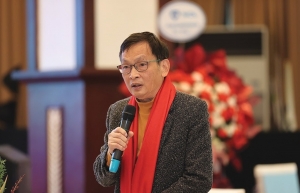Euro companies forge innovative pathways in 5G
Vietnam is preparing to commercialise 5G this year. What future plans are member companies of EuroCham working on to tap into the local potential?
 |
| Pavel Poskakukhin, co-chairman of the EuroCham Vietnam Digital Sector Committee |
Member companies of EuroCham’s Digital Sector Committee (DSC) are envisioning ambitious strategies to leverage Vietnam’s rapidly expanding digital landscape. Through collaborative endeavours with local enterprises and startups, these companies are forging innovative pathways tailored to the unique dynamics of the Vietnamese market. These joint ventures aim to fuse international expertise with local insights, fostering the development of cutting-edge solutions that resonate with Vietnamese consumers.
Integral to these plans is a concerted focus on investment in research and development. By allocating resources to such initiatives, DSC member companies seek to propel technological advancements and nurture a culture of innovation within Vietnam. These investments drive business growth and contribute to the broader ecosystem by fostering knowledge exchange and skill development.
Moreover, sustainability lies at the core of these future endeavours. Recognising the importance of corporate social responsibility and sustainable practices, DSC members are integrating environmental stewardship into their business strategies.
In alignment with these principles, EuroCham’s DSC member companies are actively engaging with local communities to understand their needs and aspirations. By co-creating solutions with local stakeholders, these companies ensure that their offerings are relevant and sustainable in the Vietnamese context.
Beyond business objectives, DSC member companies are committed to contributing to the broader socioeconomic development of Vietnam. By aligning their growth strategies with societal needs, these companies seek to foster inclusive prosperity and empower local communities. This entails initiatives such as skills development programmes, job creation efforts, and support for small- and medium-sized enterprises.
Vietnam is said to face a digital divide. What should the country do to avoid this problem and to encourage foreign-invested enterprises (FIEs) to join?
To tackle the digital divide in Vietnam and encourage the participation of FIEs, a multi-faceted approach is imperative. Vietnam’s progress in connectivity notwithstanding, rural and remote regions still face limited access to reliable internet infrastructure, highlighting the need for comprehensive solutions.
Efforts to expand broadband coverage and reduce connectivity costs should be prioritised to bridge this gap. Public-private partnerships emerge as a key strategy, leveraging the expertise, resources, and technology of FIEs. By fostering collaboration between FIEs, local communities, government agencies, and non-profit organisations, tailored solutions can be developed to address the specific challenges faced by underserved populations.
Central to this effort is the promotion of digital literacy and skills development programmes. These initiatives are essential to ensure inclusivity and empower marginalised communities to fully participate in the digital economy. By equipping individuals with the necessary knowledge and skills, Vietnam can unlock the potential of its population and drive socioeconomic growth.
In practical terms, initiatives such as community broadband projects, mobile internet vans, and targeted digital literacy programmes can make a significant impact. Community broadband projects, for instance, can extend connectivity to remote areas, while mobile internet vans can bring internet access to communities on the move or lacking fixed infrastructure.
By prioritising equitable access to digital services and fostering collaboration between public and private stakeholders, Vietnam can address the digital divide and create an environment conducive to the participation of FIEs. This collaborative approach promotes economic development and fosters social inclusion, ensuring that no-one is left behind in the digital age.
What are the conditions Vietnam needs to have to ensure successful 5G commercialisation, and could you share some of the successful examples?
To ensure successful 5G commercialisation in Vietnam, several key conditions must be met. Firstly, there must be substantial investment in infrastructure, including the widespread deployment of base stations and fibre-optic cables. This infrastructure forms the backbone of the 5G network, enabling high-speed connectivity and low latency.
Additionally, regulatory frameworks must be streamlined to create an environment conducive to investment and innovation in telecommunications. Drawing inspiration from successful use cases globally, Vietnam can tailor its approach to 5G implementation.
Furthermore, the concept of smart cities showcases the potential of 5G to enhance urban living. Through the integration of 5G-enabled sensors and AI algorithms, cities can optimise traffic management, conserve energy, and bolster public safety measures.
For instance, in South Korea, 5G-powered drones provide real-time data on crop health, revolutionising agricultural practices and increasing efficiency. By emulating successful use cases and adapting them to local contexts, Vietnam can accelerate its 5G journey and unlock new opportunities for development and prosperity.
Through strategic investments in both infrastructure and regulatory reforms, Vietnam can position itself as a leader in 5G innovation, driving growth across multiple sectors of the economy.
 | 5G network inches ever closer Investment returns may be some way off for telecoms groups, despite taking on ownership of 5G frequency bands via auction. |
 | New era opens for 5G commercialisation The March auction of frequency bands for 5G marks an important milestone in the country’s 5G commercialisation. The auction of the B1 and C2 frequency band blocks was successful, while the C3 band was not, as not enough qualified businesses were interested. |
 | Accelerating Vietnam’s journey towards 5G 5G remains on track to become the fastest-adopted mobile generation: 5G mobile subscriptions are forecast to have topped 1.6 billion at the end of 2023, and 5.3 billion by 2030. However, we are still early in the 5G cycle and only 28 per cent of 4G sites globally have been upgraded to 5G mid-band. Likewise, only 1.6b 5G subscribers, out of a total of 8.5b mobile subscriptions, enjoy the benefits of 5G. |
 | 5G experiences will guide way for Vietnam Asia is considered the pioneering region in deployment of 5G commercialisation in the world with some typical markets such as South Korea, China, Japan, and others. |
What the stars mean:
★ Poor ★ ★ Promising ★★★ Good ★★★★ Very good ★★★★★ Exceptional
 Tag:
Tag:
Related Contents
Latest News
More News
- Vietnam sets ambitious dairy growth targets (February 24, 2026 | 18:00)
- Masan Consumer names new deputy CEO to drive foods and beverages growth (February 23, 2026 | 20:52)
- Myriad risks ahead, but ones Vietnam can confront (February 20, 2026 | 15:02)
- Vietnam making the leap into AI and semiconductors (February 20, 2026 | 09:37)
- Funding must be activated for semiconductor success (February 20, 2026 | 09:20)
- Resilience as new benchmark for smarter infrastructure (February 19, 2026 | 20:35)
- A golden time to shine within ASEAN (February 19, 2026 | 20:22)
- Vietnam’s pivotal year for advancing sustainability (February 19, 2026 | 08:44)
- Strengthening the core role of industry and trade (February 19, 2026 | 08:35)
- Future orientations for healthcare improvements (February 19, 2026 | 08:29)




















 Mobile Version
Mobile Version